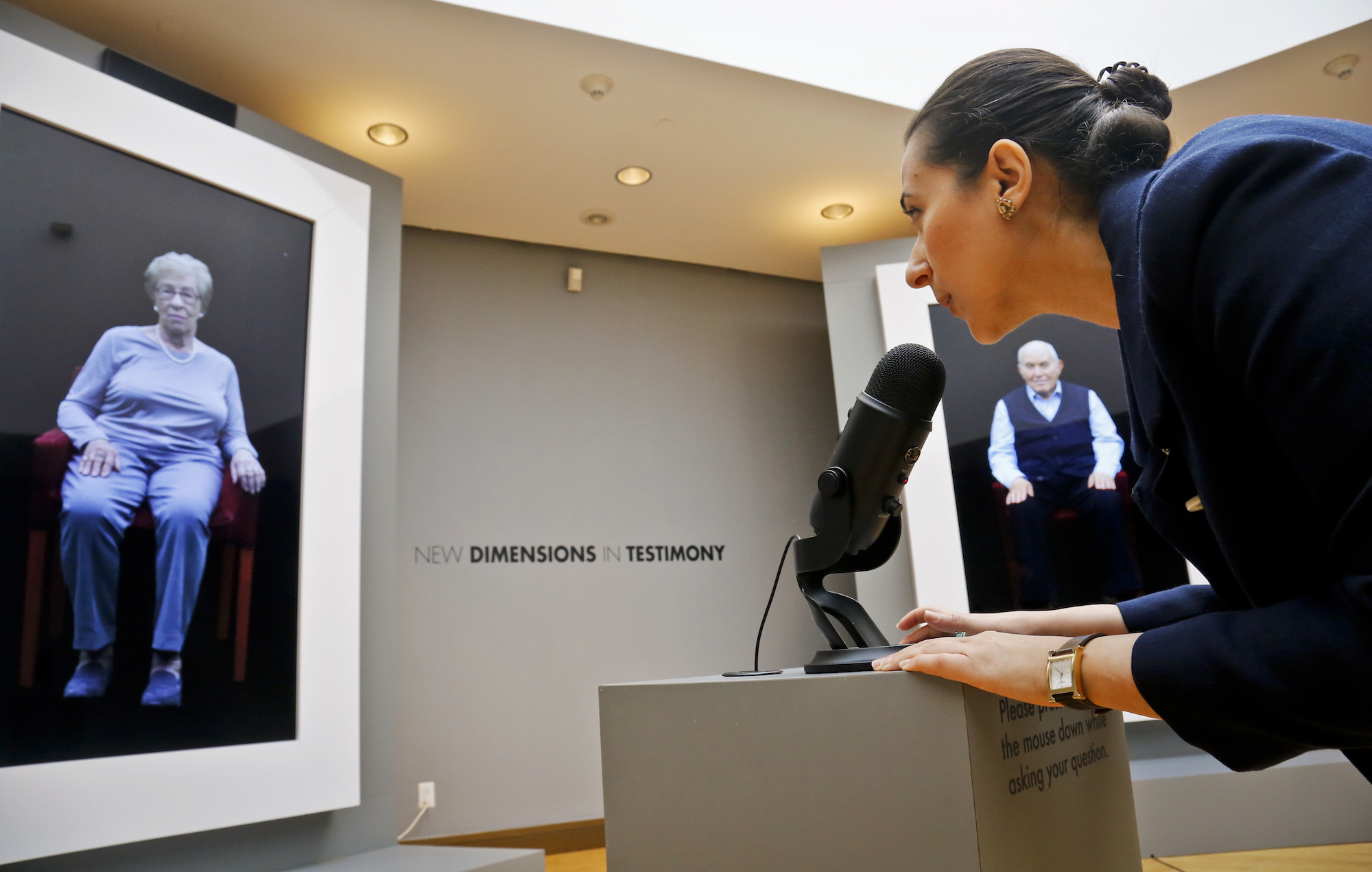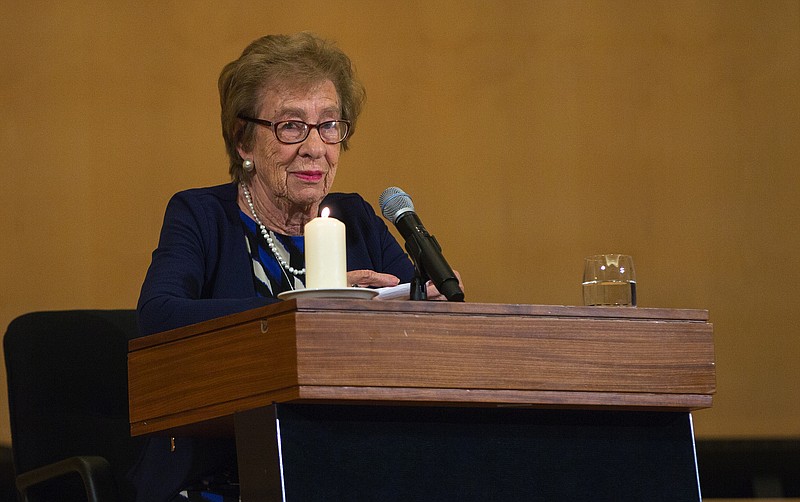A U.S. speaking tour brought Holocaust survivor Eva Schloss to Memorial Auditorium Sunday night. If her name is not familiar, you've surely heard of her stepsister, Anne Frank.
Frank's death is one of the most poignant casualties of the Holocaust. For two years during World War II, she and her parents, Otto and Edith, her older sister, Margot, and four other German Jews remained in hiding during the German occupation of the Netherlands, where the Franks had fled after the Nazis came to power in Germany.
Anne had just turned 13 when her family's captivity began. Among her birthday gifts was a diary, which she wrote in regularly while in hiding. The last entry comes just before their arrest by the Gestapo in August 1944. The family members were separated, with Anne and Margot transported to the Bergen-Belsen concentration camp, where they died of typhus in early 1945.
If you go
› What: Voices of Auschwitz: An Historic Evening With Eva Schloss.› When: 7 p.m. today, Oct. 14; doors open at 6 p.m. › Where: Memorial Auditorium, 399 McCallie Ave. › Admission: $25 adults, $20 groups of 10+.› Phone: 423-757-5580. › Website: www.tivolichattanooga.com.
Otto, the only survivor of the Franks, returned to Amsterdam after the war to find that Anne's diary had been saved by his secretary. His efforts led to its publication in 1947 as "The Diary of a Young Girl," an account that has been read by tens of millions.
Seventy-three years later, the memory of her posthumous stepsister still looms large for Schloss, 89. The two girls lived in the same apartment block and were occasional playmates before their families went into hiding. Schloss' mother, Elfriede Geiringer, married Otto Frank in 1953 after both were widowed in the Holocaust.
For some 40 years, Schloss did not speak of the atrocities she experienced in the war, nor of her suicidal depression that followed. She has said she wasn't greatly impressed by Anne's diary early on.
"I could see its appeal, though," she told British newspaper The Guardian in a 2013 interview. "In the '50s and '60s, people were starting to show interest in what had happened in the war but didn't want to be reminded of the full horrors. Anne's book wasn't about the Holocaust at all. It was about hiding away. That was nothing new to me. I had hidden away in the war too before we were captured. But nobody wanted to hear my story."
According to news accounts, it was only after her stepfather's death in 1980 that she felt compelled to take on the responsibility of keeping Anne Frank's name alive.
Since 1986, the London resident has traveled widely, giving talks, visiting schools and writing books: "Eva's Story" in 1988, "The Promise" in 2006 and "After Auschwitz" in 2013. In 2017, she was the subject of the documentary "116 Cameras," in which she recounts her experiences for an interactive hologram that will preserve her story for generations to come.
Despite her early reluctance to share her experiences, she now feels compelled to speak out on the moral lessons of genocide - especially on how the horrors laid bare in the daily news - from the plight of refugees to religious persecution - can be so easily met with indifference.
 Josephine Mairzadeh, right, uses a microphone to pose a question to a virtual presentation of Holocaust survivor Eva Schloss, left, featured in a testimonial interactive installation called New Dimensions in Testimony at the Museum of Jewish Heritage in New York. The exhibit is giving visitors a chance to interact with virtual versions of Holocaust survivors Pinchas Gutter and Schloss on video monitors, as they provide answers to questions based on many hours of recorded interviews.
Josephine Mairzadeh, right, uses a microphone to pose a question to a virtual presentation of Holocaust survivor Eva Schloss, left, featured in a testimonial interactive installation called New Dimensions in Testimony at the Museum of Jewish Heritage in New York. The exhibit is giving visitors a chance to interact with virtual versions of Holocaust survivors Pinchas Gutter and Schloss on video monitors, as they provide answers to questions based on many hours of recorded interviews."I talk about it and tell people, this is what Germany was," she told The Washington Post before a February appearance at George Mason University in Fairfax, Virginia. "Not everybody was - by no means - anti-Semitic or supported Hitler. They had good Jewish friends, but they took the easy way out and looked the other way.
"It is the danger of the bystander," she said. "This is what we have to teach young people - not to be indifferent, but take part; if you see injustice being done, speak out."
It's a message Rabbi Shaul Perlstein of Chabbad Jewish Center of Chattanooga says all should take to heart. He has heard Schloss speak twice now and was instrumental in scheduling the Chattanooga appearance. Initially, organizers were told it would take years to book Schloss, but then they discovered she is friends with Erlanger CEO Kevin Spiegel and his wife, Judy.
"Two days later, I got the call that Eva demanded a stop in Chattanooga to visit her friends, so we [could] book for this year," he says.
Perlstein says the parts of Schloss' message that have most resonated with him are her cautions about how quickly social norms can change.
"As a society we have to focus and strive on being more respectful and accepting of one another," he says. "It is not enough to let negativity slide by. By the time we turn around, it can turn into a monster. Rather we must be active participants in making our surroundings and communities more peaceful.
"In today's political strife, I think this message is all the more important. Regardless of one's color, race, beliefs, politics or religion, we must work on creating a loving environment for all people."
Contact Lisa Denton at ldenton@timesfreepress.com or 423-757-6281.
